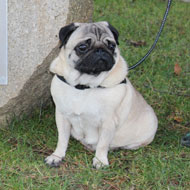
Uveal melanoma work could provide a minimally invasive test
Two years after opening the doors to its cancer centre, the Animal Health Trust (AHT) is celebrating its progress so far. It has also revealed the results of some of its groundbreaking research.
Since HRH The Princess Royal opened the AHT's Kennel Club Cancer Centre late in 2012, it has treated over 130 dogs with 15 types of cancer. To date, it has also administered more than 1,300 doses of radiation. With a growing caseload, 2015 is set to be the centre's busiest year yet.
Research undertaken at the centre over the past year could result in a minimally invasive test for uveal melanomas - similar to a test that is already used in humans.
Uveal melanomas are the most common form of primary eye cancer, and are seen in all dog breeds. Currently, the only way to predict whether they will spread is to remove the affected eye or a significant part of the eye. As a result, eyes are sometimes removed unnecessarily as the tumour is found to be benign.
AHT researchers, however, have discovered several "biomarkers" that are present in different quantities in uveal melanomas that have spread, and those that have not. These biomarkers can be measured with just a small number of cells collected from the eye using a fine needle.
This discovery could lead to the development of a minimally invasive test to predict whether uveal melanomas will spread. Patients would therefore not need to undergo anaesthesia and surgery for a tumour biopsy. A fine-needle aspirate-based test is already available for uveal melanomas in humans.
Future research at the centre will use the same methodology to anaylse oral melanomas and mast cell tumours - two of the most common types of cancer seen in dogs. It is hoped this work will lead to the development of better prognostic tests, helping clinicians to choose the most appropriate treatment for affected dogs.
Dr Mark Vaudin, the AHT's CEO, said: "We’re hopeful that in the future we’ll be even closer to developing tests which will help vets to more accurately diagnose and treat cancers in dogs."
The build of the cancer centre was funded by a £1.5 million loan from the Kennel Club, which the AHT repaid in full this week.
As well as treating dogs, the cancer centre also takes on cat and horse cases. It offers a full spectrum of treatments including surgery, chemotherapy and radiotherapy, on the same site as its dog cancer research programme.
Image courtesy of the AHT



 The Animal and Plant Health Agency (APHA) has updated its online reporting service for dead wild birds.
The Animal and Plant Health Agency (APHA) has updated its online reporting service for dead wild birds.